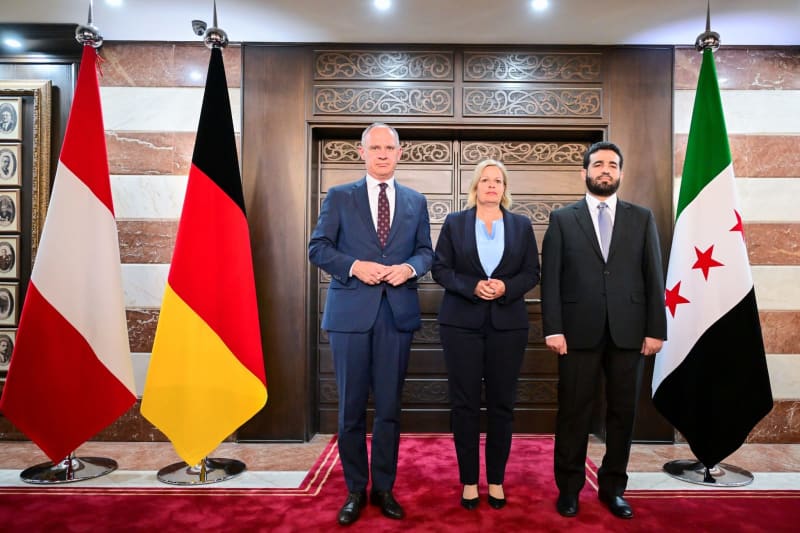German Interior Minister Nancy Faeser arrived in the Syrian capital Damascus on Sunday along with her Austrian counterpart Gerhard Karner for talks with the country’s transitional government about the voluntary return of Syrian refugees.
“We know how tense the security situation is and how precarious the humanitarian situation still is,” Faeser said. She said she nevertheless wants to talk to Syria’s government about prospects for the return of refugees.
“Many have found work in Germany, learned German and built a new life for themselves – they should of course be allowed to stay,” Faeser said. “Our top priority is that criminals and Islamists are deported as quickly as possible,” she added.
Faeser was greeted at the airport by a Foreign Ministry official, who described the current situation in the country as “cautiously optimistic.” With regard to the security situation, he spoke of “a few incidents.”
The German-Austrian delegation met with Syrian Interior Minister Anas Khattab, who has been in office for less than a month.
He is part of Syria’s transitional government, led by President Ahmed al-Sharaa, whose Islamist group Hayat Tahrir al-Sham (HTS) led a lighting offensive against the previous regime, toppling longtime ruler Bashar al-Assad on December 8.
At the beginning of the meeting with Khattab, Faeser said the overthrow of al-Assad offered an opportunity for democratization in Syria.
After the meeting, Khattab said: “We talked about energy and how to enable investment and create jobs. Because that will encourage Syrians who left the country during the war to return on a larger scale.”
The German government wants to support a new beginning in Syria, which after more than 13 years of war is dependent on foreign aid and the lifting of Western sanctions.
However, despite al-Sharaa’s pragmatic course, doubts remain as to whether the rights of Christians, Alawites and other religious minorities will be protected in the future. Like al-Sharaa, the majority of Syrians are Sunni Muslims.
Asylum decisions for Syrians on hold
Syria remains the main country of origin for asylum seekers in Germany, with 9,861 Syrians applying for protection in the first quarter of 2025.
Following al-Assad’s downfall, Germany’s Federal Office for Migration and Refugees (BAMF) suspended decisions on asylum applications from Syrians, citing the unclear situation in the country.
As of March 31, 52,344 Syrian asylum cases were still pending, according to BAMF figures. The Interior Ministry said 1,080 Syrians had been told they had to leave the country by the end of March.
Germany mulls allowing Syrians to visit home country
Germany’s Interior Ministry has been working since January on a legal exemption that would allow Syrian refugees to visit their country of origin without losing their protection status in Germany.
The proposed exemption would allow them to make either a single trip of up to four weeks, or two trips of up to two weeks, with the aim of exploring whether a return would be possible.
According to asylum law, if people entitled to protection travel to their countries of origin, it is legally assumed that the conditions for protection no longer apply and they may lose this status.
The only exceptions to this are if the trip is considered “morally imperative,” for example to attend the funeral of a relative.
The initiative has faced criticism from politicians from Germany’s Christian Social Union, which is set to lead the Interior Ministry under Germany’s next conservative-led government.
Final trip for Faeser
The German-Austrian delegation planned to visit Damascus in March, but the trip was called off because of a terrorism threat to Western delegations in the Syrian capital.
This is likely to be Faeser’s last trip in office, with Germany’s next government set to take office in early May.
Acting German Minister of the Interior and Home Affairs Nancy Faeser (2nd R) and Austrian Minister of the Interior Gerhard Karner (L) welcomed by Syrian Deputy Foreign Minister Yasser Al-Jundi (C) at Damascus airport. Sebastian Gollnow/dpa
Read the full article here
